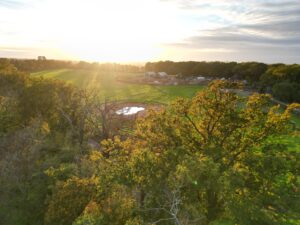The proper care of young trees can prevent many future problems. Browse our resources to learn more about how to best care for seedlings and young trees.
Planting
Ten steps to planting success
Successful establishment of new plantings is dependent on correctly matching species to site and creating a soil environment that will allow new transplants to rapidly regenerate a root system. The following 10 steps will help ensure planting success.
Mulching application guidelines
Mulches provide many benefits for trees and shrubs. However, excess mulch can actually be damaging. These guidelines will provide information on how to properly mulch trees and shrubs.
Irrigation
Moisture deficiency and over-watering can significantly affect plant health and survival of landscape plants.
Regular Care
Caring for young established trees
Because the value and benefits of landscape plants increase as they grow, promoting rapid growth is generally a key objective when managing young plants.
Structural pruning of young trees
Structural pruning of young, developing trees provides a desirable and stable form at maturity and is one of the best investments that consumers can make in their landscape.
Structural pruning of young trees
When a tree starts to grow, it can do so in an erratic pattern and introduce defects where a mature tree can fail. Structural pruning corrects these defects to help ensure success and longevity of new plantings.
Managing trees over time
Landscape trees should be managed dynamically over time to optimize growth conditions and development from youth to maturity.
Addressing Problems
Simple steps to aid stressed trees
What can be done to help plants experiencing stress? Providing optimal growing conditions can help aid in recovery and position trees to best withstand future issues.
Root collar disorders
A tree’s root collar is the area where the roots join the main stem or trunk, and is not specialized to resist constant soil moisture. Soil against the lower stem and flare tissues can lead to infection and disease caused by certain pathogenic fungi.
Bartlett’s Root Invigoration
This procedure develops an efficient soil environment that promotes growth in younger trees and helps prevent decline in aging trees.
Girdling roots
Girdling roots are usually lateral roots at or slightly below the soil line that cut into at least one side of the main trunk. These roots are an issue as they restrict the tree’s access to water and nutrients.
Ask the Experts
Experiencing a problem with a tree or shrub?
Ask an expert about it or search our resources.



